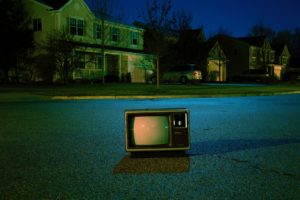by Jenny Rose | Feb 26, 2022 | Choice, Power
We are paradoxically stuck in the process of moving. Sometimes I feel we’ll never stop moving, and we’ve never done anything except slog through moving. Not true, of course. It’s only been about 4 months.

Photo by Michal Balog on Unsplash
One of the fun things about moving, for me, is creating a new home. Rearranging possessions and furniture. Making new mental maps of space and how to navigate from the bedroom to the bathroom to the kitchen. I’m looking forward to that, but every day it feels farther ahead in an unobtainable future.
I’m figuring out strategies to help myself through this.
Right now, I’m metaphorically rearranging my mental furniture.
Most people arrange their living rooms around the focal point of a screen. It’s funny to think that’s only been true for the last 100 years or so. I would hardly know what to do with a living room that does not contain a screen.
Currently, my mental and emotional living room is overwhelmed by a big screen on which the reality show Moving is endlessly and relentlessly playing. Attached to the screen, of course, are a sound system, remote controls, and all kinds of additional tech and equipment. Beside the screen is a neon calendar counting down the weeks to yet another closing date (our fourth), and along the bottom of the screen a continuous feed of rising interest rates and costs for everything from cat food (if you can find it) to heating oil. I don’t have room to breathe. I can’t escape the noise. I can’t pull my attention away. I feel imprisoned and disempowered.
I want it to be over, to turn it off, to turn away, to think about something else.
I have hot, red fantasies of sledge hammers and the sound of smashing glass. (This is an old fantasy. I am a secret wannabe serial TV screen murderer. Turn off the effing TV!)

Photo by Frank Okay on Unsplash
I can’t do much about the fact that the only sheets I still have unpacked are flannel, boxes are stacked to the ceiling in one room, another room is filled with empty boxes, tape, packing material, markers, and objects waiting for the right sized container. I’m not going to start unpacking because the weeks are dragging on.
But I can do something about my internal landscape, and I have got to get that screen out of my living room! Turning it off is not enough. It has to go, along with the sound system, remote controls, calendar, and scrolling rising interest rates.
I decided, a few days ago, to Stop Caring. Just stop. At least, Stop Caring so much.
I did Stop Caring for a day or two. A friend asked me what I did over the weekend, as she knew I was going to Stop Caring about Moving. I told her I worried about not caring, and she laughed. Will I stay stuck forever if I don’t Care? Am I supposed to Care? Is Caring some integral part of the process? Is something wrong with me if I Stop Caring? Am I abandoning or betraying the cause? Am I giving up?
I know. It’s ridiculous. But all you worriers understand. I know you do!
Anyway, I realized after I Stopped Caring I was feeling depressed. And I asked myself, is not Caring the same as sinking into apathy and depression?
Well, if so, that’s not good. That’s not what I want, either.
It was a relief to Stop Caring for a while. But I don’t want to Stop Caring about everything. I mean, I still have work to do, and people to love, and words to write, and the cats to enjoy. I still want to listen to music and light candles and exercise. I still want to read, and laugh, and hang out with friends.
What I want is to push back against the feeling nothing matters except Moving, that there is no life until we’ve successfully made this transition. I don’t want to watch the clock, watch the calendar, watch my email, watch the interest rates, worry about contracts, and think about all the places and ways I have no power in this process. I want to Stop Caring about all that.
I have to decide what to care about and what not to care about, and then I have to be constantly present with where my attention is and disciplined about redirecting it.
Oh, good. Just what I need. More work.
If we don’t arrange our living room around a screen, how do we use that space? What can I look at instead of the screen?

Photo by Pop & Zebra on Unsplash
A window and the world beyond it. The weather. The sky. The light. Birds and trees and all the other life responding to spring, feeling the call of mating, foraging for food, living their lives as temperatures moderate and the light strengthens.
A bookcase. If you don’t love books, this makes no sense to you. If you’re a bibliophile, I needn’t say more.
A fireplace, or hearth, or stove. A source of warmth, light, alchemy, primal comfort.
A piece of art.
A spiritual altar; maybe something as simple as a candle.
And so on.
The point is I have a choice about where my attention is and what I care about. Clock and calendar watching are not effective or useful. Neither is obsessing over the interest rate or compulsively checking my email and the latest real estate listings. In fact, those activities add to my stress and make time slow down. Far better to Stop Caring about the clock and calendar, shut the computer, and channel my Caring into enjoyable things, creative things, small tasks and pleasures anchoring me to everyday life right here, right now, in the pre-spring season in central Maine.
The places in which I have power deserve my Caring and attention. They deserve my effort and presence. I don’t need to squander my love and Care in places where it’s neither effective nor appreciated.
It’s my living room, and I’m choosing what’s in it.
Get the sledgehammer.

Photo by Josh Applegate on Unsplash
by Jenny Rose | Feb 19, 2022 | Connection & Community, Emotional Intelligence, Shadows
Now that I publish my fiction on Substack, I read regular content from the platform, and a few weeks ago the platform runners wrote an essay about censorship titled “Society has a trust problem. More censorship will only make it worse.”
I’ve read and reread that essay.
I’ve been trained as a librarian, and one of the most important tenets of professional librarians is freedom of information. One of the things that drove me out of my job as an elementary school librarian in a public school system was pressure to take Harry Potter off the shelves. I told the school board I wouldn’t do it. If they had to fire me, so be it, but I wouldn’t take the books off the shelves. I asked if any school board member had actually read one of the books in question. None had. Surprise, surprise.

Photo by John Salvino on Unsplash
Freedom of speech and freedom in general have been hot topics since the 2016 presidential election and COVID. I’ve written before about freedom of speech, which is not all-inclusive.
In the last six years, cultural censorship has increased enormously, but it’s failed to silence anti-vaxxers, proponents of the election Big Lie, COVID naysayers, and people who believe men cannot become women, or vice versa. It’s also failed to address increasing civil violence, disconnection, and unrest.
Does censorship work? Is it a useful tool?
It doesn’t appear so. I’m irresistibly reminded of the “Just Say No” drug campaign for school kids and sexual abstinence programs for teens. Do they work?
Not so much.
It seems to be a human character trait that the minute we’re forbidden to do something we move heaven and earth to do it. Look at Adam and Eve. Look at Pandora. Dozens of old oral stories from around the world are about people who broke their promise not to look and suffered the consequences.
I’ve never thought to ask myself what problem we’re trying to address with censorship.
Is it cultural trust?
Possibly. Trust is an easily manipulated quality, because it’s a belief. Belief, as we’ve seen demonstrated over and over during the last years, is more powerful than facts. People will die for their beliefs. They’ll kill for them.
Are beliefs strengthened or weakened by access to all kinds of information (facts) or opinions? Are beliefs strengthened or weakened by censorship?

Photo by Cristian Newman on Unsplash
I’m not sure trust is the root problem, though, or not the entire root. Perhaps the deepest root is education and, paradoxically, freedom. Authoritarianism is characterized by blind submission to authority. One of the tools of authoritarianism is censorship, including limiting the rights to vote, read, write, report the facts, speak, and teach.
Censorship implies people can’t be trusted with a full range of information. They are unable to make the “right” choices, according to the authoritarian(s) at the top. Thus, the public is spoon-fed only that which supports the authoritarian power. Asking questions is not allowed. Challenge is not allowed. Discussion and debate are not allowed.
Don’t you worry your little head about substance abuse. Just say no. We don’t talk about sex and our bodies in this house. It’s dirty and shameful. Just abstain from inhabiting your healthy young body.
The subject of censorship is tricky, because I suspect we’d all like to have the power to censor certain voices on social media, on radio, on television, in the bookstores, on YouTube, and on platforms like Substack. Some of the propaganda and opinions out there, the lies masquerading as facts, are horrifying. However, my lie might be your fact. Your heart-felt ideology about eating meat may be in direct conflict with what I need to sustain my health and quality of life. Should one of us have the power to censor the other?
This is where the trust problem comes in. We don’t trust one another to make the “right” choices or believe the “right” people. I think many don’t trust themselves to make the “right” choices. They rely on someone they have faith in to tell them what to do.
The “right” choices imply the possibility of “wrong” choices, but this is black-and-white, overly simplistic thinking. Perhaps you need to be a vegetarian in order to sustain your health. Perhaps I need to be a carnivore. We’re both right. Does that mean a full range of diet and nutrition information should be available to all? Can we, as a culture, agree to live and let live?
I have my doubts.
The current specific issue on Substack is the subject of COVID. Evidently, there are writers on the platform spreading dis- and/or misinformation about COVID. Scientists on Substack sending meticulously researched, linked, and data-driven information take issue with that and want Substack to censor such writers for the sake of the public good.
Substack, in response, wrote the above essay, maintaining their position against censorship and explaining their thoughts about it.
I’m in sympathy with both sides. I, too, am frustrated with the sheer volume of unmitigated bullshit out there. But I never forget many people would say my sources of information are bullshit, and I would fight hard to maintain access to those sources.
Maybe the problem is not how deep the bullshit is, but how bad we are at recognizing it. And that’s a product of our broken education system and our inability to think critically. Both these cultural trends make us increasingly vulnerable to authoritarianism.
As I’ve discussed before, choice goes hand-in-hand with responsibility. If we want optimum freedom to choose, we must accept the consequences of our choices.
Taking responsibility for our choices is not humanity’s greatest strength at this moment in history.
If I was Supreme Ruler of the World (God forbid), I believe I would vote with Substack on this issue of censorship. Silencing people does not address the root of the problem, only a symptom. We need to figure out a way to fix our educational system so we all learn critical thinking at every stage of education. Not only does this empower people to make their own choices and recognize the difference between lies and truth, opinions and information, it allows public access to a full range of viewpoints.
We are never going to silence the liars and manipulators. They will continue to try to obtain power and money, and they will continue to aggressively work to silence those who disagree with them. The best weapon against them is to firmly empower ourselves and others with education and the ability to think critically. We don’t need to be protected. We need to be armed.

Photo by Nicole Mason on Unsplash
by Jenny Rose | Feb 12, 2022 | A Flourishing Woman, The Journey
I’ve written before about rewriting our personal narratives. I’m revisiting the idea, this time in terms of rewriting the past.
Pete Walker’s material on complex post-traumatic stress disorder suggests revisiting old traumas remaining in our memory as painful, nonhealing wounds, and rewriting. He talks about it in terms of time travel. One goes back, as an adult, into memories of childhood and enters the scene as a new character, creating a new and different narrative. Our adult selves can defend our child selves, shield them, help them explain themselves, provide comfort to them, and, if needed, remove them before whatever terrible experience occurred.

Photo by Angelina Litvin on Unsplash
Intrigued, I tried this method, and I was shocked, though I know the power of stories, at how well it worked and how much fun it was. Not only has it helped me heal from past trauma, it also strengthens my ability now to automatically stay on my own side and defend myself.
Seth Godin also talks about this concept. His language is “rewriting the script.” Same idea, slightly different presentation. Godin is business oriented, while Walker is psychology oriented.
Godin suggests, instead of saying to ourselves “here we go again,” we simply rewrite the script this time, which means we throw away our expectations and take each experience as a fresh one, rather than another terrible iteration of something in our past.
This is powerful for me as we navigate the process of moving house. I’ve done it more times before than I want to count, and I’ve always found it deeply traumatic, but this time is different. In spite of broken contracts, changing timelines, obstructions and reversals, and the usual financial and physical stresses, I’m managing to stay grounded and balanced. It feels like a rough patch, for sure, but I don’t feel traumatized. I have moments of amusement and even more moments of curiosity. What on earth will happen next? How will this all work out? Where will I be sitting in 6 months?
Old traumas and wounds are just that – old. We don’t have to insist new, similar experiences cut as deeply. It is a choice, although not an obvious one. We could just tear up our old scripts, the ones that hurt us, the ones that never work out for us, the ones filled with fear and heartbreak, and write a new one. Now does not have to be the same as then.
In yet another way to think about this, I came across advice from a writer on how to appreciate one’s progress. She, too, suggested time travel. If we feel stuck and as though we’re making no progress, and never have, and never will, and what person X told us way back when we were children, that we’ll never amount to anything, seems a curse we can never lift, we can sit quietly with ourselves and think back a year, or five, or ten. Stepping back helps us gain perspective and see exactly how far we’ve come, how much we’ve learned, how much we’ve grown. What if we went back, in imagination, to cheer on the self we were a year ago, whispering to them of all the wonderful progress ahead?
Scripts and storylines can be changed. We don’t have to give them our power. It’s so easy to forget that. It takes an act of presence and will to change the script and reclaim our power, but we can let go of our limiting expectations and beliefs and allow ourselves a different kind of experience. Not here we go again, but here’s a new experience – I wonder what will happen?
Sometimes all we need to do is shift our gaze from the hopeless and frightening places where we have no power and focus on the places we do. If we can stay there, rest there, live there, the chaos and tumult, though unpleasant, won’t knock us down and trample us. Such times pass by, pass over without traumatizing us, and we’ll come out on the other side more resilient than ever.

Photo by Leon Liu on Unsplash
by Jenny Rose | Feb 5, 2022 | Choice, Power
I’m doing it again. Dissenting. Doubting. Questioning the status quo. Looking for new or buried information.
Thinking critically, in other words.
I know unthinking conformity is convenient, but I’ve always been an inconvenient sort of person.
It’s lonely.
This time it’s about diet, and fat, and cholesterol.
I’ve written several posts on this subject before. Here’s the first one.

Photo by Lukas Budimaier on Unsplash
I know it’s all wrong to eat meat and animal fat and stay away from plant-based food of any kind, but it solved my health problems.
I’ve had a lot of bad experience with doctors. For much of my life, I’ve been completely intimidated by doctors or anyone else in authority, especially men. I’m not afraid of blood draws and exams, but unable to speak up for myself, ask questions, or dare to Fail To Please in any way. Which means in and out of the office as fast as possible, making no fuss, not speaking except to answer questions succinctly, never disagreeing, and thanking the doctor extravagantly for their time and trouble, even if (especially if) I felt completely unseen, unheard and unsupported.
(Oh, and desperately minimizing any problems I do have so as not to be a whiner or come across as drug- or attention-seeking. Because it’s bad to need help.)
In short, fawning from the beginning of the appointment to the end.
This experience has meant I avoid health care, aside from well-woman exams and an occasional emergency visit for antibiotics or an injury.
When I have been to the doctor for things like chronic pain, insomnia, depression, and anxiety, I’ve been offered medication rather than information. I don’t want to take long-term medication. I want someone to help me understand what the underlying problem is, not slap a band-aid on it. That means I want to exchange information, which takes time, and ask questions. I want to be given resources and options.
Here in Maine I’ve found a health care provider I like and respect. She’s intelligent, personable, and doesn’t make me feel as though I’m nothing but a nuisance. With her help, I’ve caught up on all appropriate scans, screens, and tests. It’s nice to feel empowered to take care of my own health.
However, part of screenings and tests for women my age have to do with identifying risks for cardiovascular disease, and according to current standards of care I am at risk, solely because of my diet and cholesterol panel.
Current guidelines and standards are built on the longstanding lipid hypothesis, which states diets high in animal fats lead to atherosclerosis, which leads to heart disease. Other, equally longstanding evidence-based data from around the world over a span of decades suggests the opposite, not only that cholesterol is not an indicator of heart disease, but it’s actually protective against it, especially for women. Many doctors, Ph.Ds, and biochemists believe the lipid hypothesis is false and based on a severely flawed original study, which means all the current guidelines (diet and nutrition recommendations and pharmacology to reduce cholesterol) and standards of care built upon it are ineffective, at best. This is validated by staggering and rising rates of obesity, diabetes, heart disease, and other health problems in the American public since the lipid hypothesis began to change diet and nutrition guidelines, food production, and medical care in the 1950s.

Photo by freestocks.org on Unsplash
However, the lipid hypothesis is enormously lucrative for Big Ag, Big Pharma, and food producers, and those entities have frightening wealth and political power, more than enough to successfully stifle any funding for unbiased studies, silence independent scientists researching diet, fat, and cholesterol, and corrupt or bury any data that does not support the lipid hypothesis.
I am not getting my information from Facebook or conspiracy theories. I’ve spent years researching and reading, both in books and online, about diet, fat, and cholesterol. I don’t take the position that current cardiovascular guidelines are wrong, but neither am I convinced they’re right. I don’t know, and I know I don’t know, but the evidence tells me there’s plenty of room for doubt. My experience tells me a high-fat, low-to-no-carb diet is the key to my own health.
I want to have a discussion about it with my healthcare provider. I want to talk about studies. I want to ask questions. I want to be allowed to have doubts and concerns. I want to weigh my overall excellent health and function against numbers that may or may not have much to do with heart disease. I want to share links and be given suggestions for research.
I want to consider the possibility that current standards of care are based on a hypothesis that is incorrect.
I scheduled a phone call to discuss some of my test results. My provider expressed her concern about one particular result and thanked me for an email I had sent her, containing several links and information sources I find useful and interesting.
She was polite. I was polite. But our previously warm and friendly connection had vanished. I don’t believe she read anything I sent. I asked a couple of questions about studies and different ways to assess cholesterol panel results, but she dismissed it all. Flat. Businesslike. Professional.
It was a disappointingly brief conversation. I was clear about what I would and would not do. We came up with a plan. We hung up.
I spent the rest of the day feeling like an extremely anxious, difficult, bad child, waiting for catastrophe because I Failed To Please.

Photo by Ashkan Forouzani on Unsplash
All healthcare workers are under the gun these days. I work in a hospital myself, and come in for my share of politically-motivated bullshit regarding COVID. Healthcare providers are understandably exhausted, burned out, and defensive. I’m probably just one more patient influenced by some crazy ideology on the web, as far as my provider is concerned. She has a standard of care to adhere to that’s clean, clear, and congruent with the organization’s policies and procedures, which are congruent with the American Heart Association and all the other powerful medical organizations’ guidelines. She doesn’t have the time or energy to debate with patients about vaccines, dietary fat and cholesterol, or anything else.
But what if current cardiovascular preventive care is based on bad data? What if the truth has been buried under politics and capitalism for decades? What if I feel in the best health of my life because I am in the best health of my life, and nothing’s wrong, nothing needs fixing?
I don’t want to suffer from heart disease, cancer, or other health problems any more than anyone else does. I value my good health and work hard to eat right and stay fit. I want to learn about my own metabolism and physiology. I don’t want pharmacological fixes for issues that might not even be real problems.
I feel sad and frustrated and very alone. I’m feel as though I’m being punished for being a sceptic, and researching and thinking for myself. I’m back in the familiar pattern of asking questions and having people shut down, or withdraw and withhold.
I suppose at the end of the day we all wind up with ourselves and the best choices we can make with the information and resources we have. I know what the right thing is to do for myself at this point. I might get new information. Things might change. I might make a mistake, or be wrong, and suffer consequences. I’m prepared for all that. Things change. I can change with them.
This time I’m not blaming myself for the way I feel. This time I’m seriously considering the possibility that I’m not broken, but our healthcare system is. I’ll continue to take responsibility for my own health and well-being. I’ll continue to read and research as new data and studies become available for review. I’ll continue to doubt, dissent, question, and seek information.
I cannot blindly follow an organization, a system, or a set of expectations and rules from anyone. Data can be and is misinterpreted. It can be frankly corrupted by politics and capitalism. Much of what I’ve learned in my life I’ve had to unlearn and replace with something more effective. I’ve never been able to understand why we are so resistant to being wrong. How can we ever learn if we can’t be wrong? How can we ever go forward and build on our experience and observations? How can we ever hope to improve anything?
So here I am, skeptical again, and paying the price for it. But I’m going to stay on my side and continue to support my healthcare choices, even if I can’t find professional support. I’m not going to fawn, or let my fear chose for me, or apologize for who I am. I’m going to exercise my power to say yes and no, think critically, and advocate for myself, regardless of the expectations of others.

Photo by Tanja Heffner on Unsplash
by Jenny Rose | Jan 22, 2022 | A Flourishing Woman, Creativity
One of my greatest unconscious defaults in life is avoidance. I know now, thanks to Peter Walker and his work, avoidance is a natural trauma response.
Nothing makes me crazier than people who avoid unpleasant things.

Photo by Ian Espinosa on Unsplash
Is there a pattern here? (Laughter in the wings.)
I’m thinking about this because I’m steadily publishing my fiction in serial form on Substack, week by week, about 10 pages by 10 pages, and it’s a challenge.
Something in me wants to avoid revealing my own creativity. My writing takes me to some dark, and some people would say inappropriate, places. Every week (I just posted for the 8th week), I push myself through whatever the content of my post happens to be. More than that, I deliberately take it on in an accompanying essay.
I’m an expert in self-sabotage. I’ve been doing it my whole life, largely through simple avoidance. At the same time, it appears my previously intermittent and now increasing tendency to call a spade a spade and be honest about my experience is one of the characteristics others struggle with most when they deal with me.
It’s a strange paradox, and it creates ongoing internal tension.
The avoidant part of me is childish and disempowered. The direct, take-the-bull-by-the-horns part of me is powerful and hangs out with Baba Yaga.
I love the direct part of myself, but I don’t think anyone else can. I think others want the avoidant woman, because she’s so damn “nice.”
Ick.
When I first began writing creatively, I thought it would all be sweetness and light, love and romance, happily ever after.

Photo by Peter Forster on Unsplash
As the years passed, and I expanded out of (mostly bad) poetry, played with writing oral stories, and then started seriously writing fiction, my output took a darker turn. The sweetness and light included bitter and dark. The love and romance became raw sensuality and included detailed sexual content. I took old fairy tales, cleansed by the brothers Grimm and others, and excavated the darker, dirtier, more violent roots. My characters graphically tore out eyes and watched them change into marbles. They killed people. They ate people. Shapeshifters had sex. Towers fell. People went to war and practiced genocide.
My writing wasn’t dark on every page, but it wasn’t sweetness and light on every page, either. It made me cry. It made me cringe. It made me uncomfortable because of its emotional power. I wondered at myself. Yet never have I been so captured, so challenged, so confident, so happy as I am when writing.
After all, in those days almost nobody read it! I wrote for myself, and held nothing back.
Now I’ve deliberately changed that. Now anyone can read it. And some people are.
For a while I considered cutting the parts I judged as being too … what? Too honest? Too sexy? Too potentially offensive? Too violent? Too real?
Yes. All those things.
My impulse was to avoid revealing myself. Stay safely hidden. Stay small. Refrain from making myself or anyone else uncomfortable.
Even as I considered that, I knew I wouldn’t. I knew I couldn’t betray myself that way. If I’m to be judged as not good enough, I want the judgement based on the deepest, most complex, most powerful and honest work I’m capable of.
Because that’s the only way my writing is good enough for me.
My Substack post last week included explicit sexual content. There will be more, but that was the first. I wrote an essay to go with it titled “Creating the Webbd Wheel: Sex.” I’ve been worrying about that post for weeks. In the end, I kept it simple and direct. I was writing about sexual content. The title was clear. Why prevaricate?
Substack provides writers with statistics 24 hours after they post, and I was informed my essay got the most reads of anything I’ve posted so far.
I’ve been giggling ever since. So far, nobody’s given me a bad time about my sexual content, but even if they do, I know I was right in what I wrote in that essay. Nobody wants to talk about sex, and we all have a lot of judgement and fear around it, but that doesn’t mean it occupies none of our private attention. We can’t amputate ourselves from our sexual nature, no matter how much we wish we could or others tell us we should.
I will probably unconsciously default to avoidance for the rest of my life. It’s a deeply-rooted pattern. I’m socially rewarded for being “nice.” On the other hand, I personally value authenticity and honesty far more than I do niceness. I want to grow up to be direct and clear. Not mean, but not avoidant or arguing with what is, either. It’s a fine line, one I don’t walk steadily or gracefully.
But I’m not going to avoid the attempt.

Photo by Jon Flobrant on Unsplash















